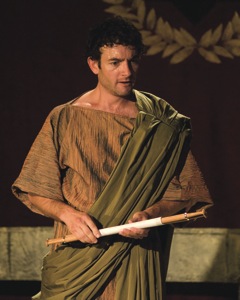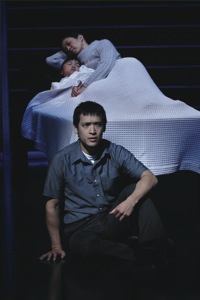-
- Democratic presidential candidates address GLBT rights in television forum
- Gay man’s relatives upset about canceled memorial service at Texas
- Newly revised manual on Reform Judaism includes transgender blessings
- Professor takes aim at ‘religious right’ in new book
- ‘Anti-equality’ Rove resigns post as Bush adviser
- Drive against Oregon gay rights laws appears flagging
- National News Briefs
- World News Briefs
Arts & Entertainment
A classic and a quake
'Julius Caesar' and 'after the quake' reviewed
Published Thursday, 16-Aug-2007 in issue 1025
Julius Caesar
New Village Arts Theatre’s sixth annual “Free Shakespeare in the Park” series moves inside this year to give audiences a peek at NVA’s spiffy new digs next to the Coaster station in downtown Carlsbad.
T.S. Eliot once said that “immature poets borrow; mature poets steal.” In Julius Caesar, a retelling of the historical conspiracy against the emperor spearheaded by Caius Cassius (Patrick Wenk-Wolff), Shakespeare proved himself a master thief. He did little more than rephrase Sir Thomas North’s idiomatic translation of Plutarch’s account in Lives of the Noble Grecians and Romans.
But those immortal phrases and quotable quotes were all the Bard’s, as was his emphasis on the psychology of ambition. Power corrupts, he points out, but it’s often the lust for power that ultimately does us in.
Shakespeare condenses into three days what actually took three years to plan and execute. Rome was in good shape at the time, and as the play opens, Romans are celebrating Caesar’s latest military triumphs.
Cassius knows he has to sway the much-loved Brutus (Francis Gercke), “the noblest Roman of them all,” to his cause in order to succeed. He does it by selling Brutus on the notion that tyranny is just around the corner. His evidence? Caesar’s friend Marc Antony (Chris Conner) offered Caesar (Walter Murray) a crown three times, and though Caesar refused each time, the idea is enough to move Brutus into the conspirators’ camp.
Caesar almost thwarts the plan himself, when he nearly succumbs to his wife Calpurnia’s urging to stay home on the Ides of March. But Casca (Tom Hall) is sent to convince Caesar to show up at the Senate. He succeeds, and Caesar is stabbed by the conspirators in turn. Brutus is last, “the unkindest cut of all.” Acknowledging his friend’s betrayal, Caesar utters his famous last words, “Et tu, Brute?”
Theater is always a risky proposition, and New Village Arts routinely surmounts all challenges. But here, as the Ides of March bedeviled Caesar, so the weather gods conspired against NVA on opening night. It was a warm evening, and the noisy air conditioning system muffled many lines and drowned out some. That threw the sound design off, and sound effects tended to be either too loud or too soft.
Claire Townsend’s costumes looked fine, but many of the togas were made of light and slippery material, which forced some of the actors to extraordinary measures to keep them on. One actually fell off.
That aside, Gercke is a wonderfully dark and brooding Brutus who loses everything in his sincere desire to save Rome from tyranny. Wenk-Wolff’s Cassius is properly devious (there’s a bit of Iago in him). Both he and Gercke have been cast against physical type – this Brutus has a much more “lean and hungry look” than Cassius.
Chris Conner acquits himself well as Marc Antony – the funeral oration a particular high – though when he opens his eyes too wide, he gets a wild-eyed, crazed look that doesn’t suit the part.
Murray is a solid, unsuspecting Caesar. Kristianne Kurner is terrific as Brutus’ wife Portia, as is Aaryn Kopp in dual roles as Calpurnia and Lucilius. Tom Hall gives the gayest reading of Casca I’ve ever seen, and it works wonderfully.
“Free Shakespeare in the Park” moves back to the park next year. This year’s Julius Caesar is worth seeing for its political message as much as for its familiarity.
Tickets for Julius Caesar at the NVA theater are sold out, but seats are available on a first-come, first-serve basis for two performances at Avo Playhouse, at 303 Main Street in Vista. Show times are Saturday, Sept. 1 at 7:30 p.m. and Sunday, Sept. 2 at 2 p.m. The box office opens 30 minutes before curtain.
after the quake
Once in a while, amid the glitz, whiz-bang technology and silliness that passes for modern theater, there is a play that stands apart, stunning us with the simple elegance of its expression and the profundity of its humanity.
Such is the case with after the quake, Frank Galati’s adaptation of two short stories by Japanese novelist Haruki Murakami. This West Coast premiere, a co-production of La Jolla Playhouse and Berkeley Repertory Theatre, plays through Aug. 26 at the Mandell Weiss Forum. Galati directs.
Galati weaves the wildly imaginative “super-frog saves tokyo” and the more realistic “honey pie,” both set one month after the Kobe earthquake in 1995. His vision is seamless, incorporating dreams and reality, alienation and love, all infused with sly humor.
In the former, a six-foot Frog (Keong Sim) spouting literary quotes from Conrad, Tolstoy, Hemingway and Nietzsche shows up at the home of meek bank clerk Katagiri (Andrew Pang) to ask his help in saving Tokyo from a huge earthquake. Frog must battle a huge (unseen) Worm “as big as a commuter train” in order to save the city.
In “honey pie,” writer Junpei (Hanson Tse), an old college friend of Sayoko (Aiko Nakasone), tells preschooler Sala (Kayla Lauren Mei Mi Tucker) stories about Masakichi, the all-time number one honey bear who sells honey but has no friends because “he was a special bear, so the others tended to shun him.”
Junpei and Sayoko, it turns out, were members of a college triumvirate who majored in literature and were friends. The third, outgoing soccer jock Takatsuki (Andrew Pang), isn’t much of a reader but took literature because it was the only entrance exam he could pass. “What the hell,” he says, “I’m going to be a newspaper reporter, so I’ll let them teach me how to write.”
after the quake gracefully jumps back and forth between stories and times, aided immensely by James Schuette’s simple but elegant set, James F. Ingalls’ evocative lighting and the music provided by cellist Jason McDermott and koto player Jeff Wichmann. John Lennon’s “Norwegian Wood” and snatches of Schubert’s “Trout” Quintet recur throughout; the in-joke is that Norwegian Wood is the title of another of Murakami’s books.
One of the joys of this production is the casting, particularly of Pang, who takes on both the mild-mannered clerk Katagiri and the beefy, breezy Takatsuki with ease. Likewise, Sim acts as the straight-ahead narrator and then becomes Frog (with the aid of costume designer Mara Blumenfeld’s green socks and gloves and green-rimmed glasses). But there isn’t a weak link in this cast.
Steppenwolf Theatre in Chicago was first to produce after the quake; it has since played at New Haven and next moves to Berkeley Repertory Theatre.
after the quake is a lovely piece, asking more questions than it answers about the line between reality and imagination and the place of human values in the cosmic scheme. It leaves viewers to ponder, discuss and wish for more. A play can do no better.
after the quake plays through Aug. 26, 2007, at La Jolla Playhouse’s Mandell Weiss Forum. Shows Tuesday and Wednesday at 7:30 p.m.; Thursday through Saturday at 8 p.m.; Sunday at 7 p.m. Matinees Saturday and Sunday at 2 p.m. For tickets call (858) 550-1010 or visit www.lajollaplayhouse.org.
|
|
Copyright © 2003-2025 Uptown Publications




